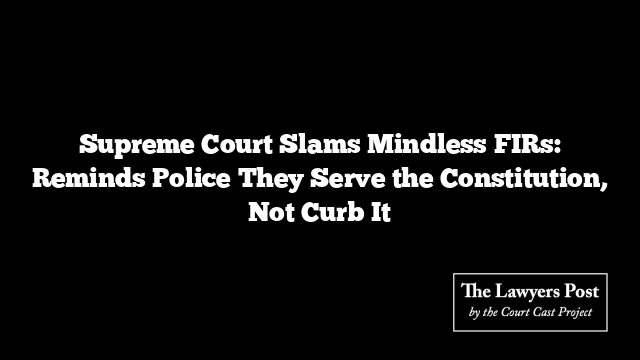The Supreme Court has issued a sharp reminder to the country’s law enforcement: you’re not just wielders of power—you’re guardians of the Constitution. And that means, above all else, protecting the right to free expression.
In a powerful ruling delivered on March 28, a bench comprising Justices Abhay Oka and Ujjal Bhuyan made it crystal clear—police officers, as organs of the State under Article 12, are bound by the same constitutional ideals they are meant to uphold. Free speech isn’t just a nicety in a democracy—it’s a foundational promise, and the police must respect that.
The case before the Court involved a First Information Report (FIR) filed in Gujarat against Congress MP Imran Pratapgarhi over an Instagram post. The video featured a poem titled “Ae khoon ke pyase baat suno”—a line that led to charges under various sections of the Bharatiya Nyaya Sanhita (BNS), including those meant for inciting enmity and causing disharmony.
But the Court wasn’t buying it.
“Liberty of thought and expression is one of the core ideals of our Constitution,” the bench declared, quoting from the Preamble and invoking Article 19(1)(a), which guarantees freedom of speech. Police, being citizens and public servants, have a dual duty: to act within the Constitution and to actively protect the rights it provides.
The justices didn’t stop at principles—they called out procedural negligence too. For alleged speech offences with punishments below seven years, officers are allowed under Section 173(3) of the BNSS to conduct a preliminary inquiry before jumping to register an FIR. That discretion, in this case, was ignored.
And ignoring that, the Court warned, isn’t just an oversight—it’s a violation. “Failing to conduct a preliminary inquiry risks criminalizing constitutionally protected speech. It defeats the very purpose of incorporating such safeguards,” the bench observed.
The ruling tore into a wider pattern: decades after the Constitution came into force, police officers still aren’t adequately trained on the basic principles it enshrines. The Court didn’t mince words—states must now launch large-scale training programs to bring law enforcement in line with constitutional values.
The message was unmistakable: if police continue to act without regard for fundamental rights, they risk becoming instruments of oppression rather than protectors of liberty. Even when a cognizable offence appears to be disclosed under Section 173(1), the Court insisted, officers must weigh that against the guarantees of Article 19(1)(a) and the reasonable limitations of Article 19(2).
In other words, rights first, always.
And while Article 19(2) allows for reasonable restrictions on speech in the name of public order, morality, or decency, the Court stressed that these must never be arbitrary. Vague, oppressive, or politically motivated crackdowns have no place in a constitutional democracy.
In its final remarks, the Court restored the priority where it belongs: the right to speak, to question, to dissent. FIRs cannot be weaponized to silence criticism, and police cannot act like censors-in-uniform.
The Constitution, the Court reminded the nation, isn’t just a document—it’s a duty. And it binds everyone, especially those in power.





